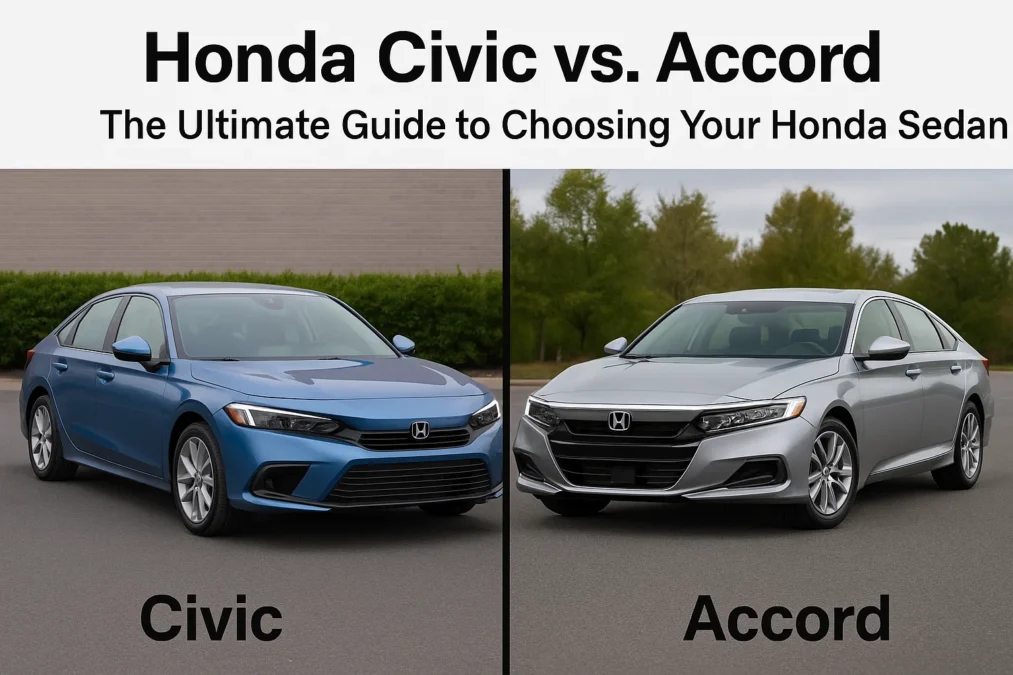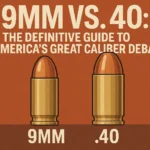For decades, the Honda Civic and Honda Accord have been more than just cars; they are institutions on wheels. They represent a legacy of reliability, efficiency, and smart engineering that has won the hearts of millions of drivers worldwide. Walking into a Honda dealership with the intent to buy a sedan almost always leads you to this classic crossroads: Do you go with the agile, efficient, and ever-popular Civic, or do you step up to the sophisticated, powerful, and spacious Accord? This isn’t a choice between good and bad—it’s a choice between two exceptional vehicles that cater to slightly different needs and lifestyles.
This definitive guide is designed to dissect every aspect of the Honda Civic vs Accord debate. We will go far beyond a simple spec sheet comparison. We will delve into the driving experience, the day-to-day livability, the hidden costs, and the intangible feelings each car evokes. Whether you’re a new driver buying your first car, a growing family in need of more space, or a professional seeking a comfortable commuter, understanding the core differences between these two icons is the first step toward making a decision you’ll be happy with for years to come. Let’s embark on a detailed journey to settle the score once and for all in the great Honda Civic vs Accord discussion.
Setting the Stage: Understanding the Core Identity of Each Model
Before we pit them against each other feature-for-feature, it’s crucial to understand the fundamental philosophy behind each nameplate. The Honda Civic has historically been Honda’s compact car champion. It’s the entry point, the agile runabout, the car known for its youthful spirit and incredible fuel economy. Its design language tends to be sportier, its footprint easier to maneuver in tight city spaces, and its price tag more accessible. The Civic has built a reputation for being a “tuner-friendly” car, with a massive aftermarket community dedicated to enhancing its performance and style.
The Honda Accord, on the other hand, occupies the midsize sedan segment. It’s the established, mature older sibling. For generations, the Accord has been the gold standard for a family sedan, blending comfort, space, and a more refined driving experience with a surprising touch of luxury. It’s the car you take on a long road trip without a second thought, the car that impresses clients, and the vehicle that comfortably fits two teenagers in the back seat. The debate between the Honda Civic vs Accord is often a debate between compact agility and midsize comfort.
Exterior Styling and Design Philosophy
The visual differences between the Civic and the Accord are immediately apparent and speak volumes about their intended audiences. The latest generation of the Honda Civic has embraced a clean, sophisticated, and almost minimalist design. Gone are the overly busy lines and fake vents of the past; in their place is a sleek, wide, and athletic profile. The roofline flows elegantly into the rear deck, giving it a fastback-like silhouette that exudes a premium, almost European feel. It’s a design that is both modern and timeless, appealing to a broad range of buyers from young couples to empty-nesters.
The Honda Accord takes this sophistication a step further, fully embracing its role as a mature and commanding presence on the road. Its front end features a broader grille and more substantial presence. The side profile is long and elegant, with a character line that runs the length of the vehicle, emphasizing its longer wheelbase. The overall effect is one of confidence and refinement. While the Civic can sometimes feel like a sporty compact, the Accord never apologizes for being a proper midsize sedan. It looks and feels like a more expensive car, which is a significant part of its appeal in the Honda Civic vs Accord consideration.
The Interior Experience: Cabin Space, Quality, and Comfort
Step inside, and the gap between the two models becomes even more pronounced. The Honda Civic’s interior is a masterclass in packaging. For a compact car, it feels incredibly spacious and airy, especially for those in the front seats. The dashboard design is clean and driver-focused, with a minimalist aesthetic that places a premium on usability. Materials quality is impressive for the class, with soft-touch surfaces where they matter most and thoughtful details that make the cabin feel more expensive than its price tag suggests. It’s a welcoming, ergonomic, and smartly designed space.
The Honda Accord’s interior, however, is where you truly see the value of moving up to the midsize segment. The first thing you’ll notice is the sheer amount of space. Legroom, shoulder room, and headroom are all significantly more generous, especially for rear-seat passengers. This makes a world of difference on long journeys or when carpooling with adults. The materials often take a step up, with more consistent use of soft-touch plastics, available leather, and real metal or wood trim accents. The sense of occasion when you sit in an Accord, particularly in higher trims like the Touring, is palpable, offering a cabin that can genuinely rival some entry-level luxury sedans.
Powertrains and Performance: Efficiency vs. Power
Under the hood, the Honda Civic vs Accord comparison presents a clear choice between maximum efficiency and enhanced power. The Civic’s powertrain strategy is centered on frugality without sacrificing pep. The standard engine across most trims is a turbocharged 2.0-liter four-cylinder or, in higher trims, a more potent 1.5-liter turbocharged four-cylinder. These engines are marvels of efficiency, delivering peppy acceleration around town while achieving some of the best fuel economy numbers in the non-hybrid compact class. The focus is on providing a smooth, responsive, and incredibly cost-effective driving experience.
The Accord has undergone a significant shift, moving almost entirely to hybrid power for its latest generation. This is a strategic move that redefines the Honda Civic vs Accord performance dynamic. The standard powertrain is now a sophisticated 2.0-liter hybrid system that combines a powerful electric motor with a gasoline engine. The result is seamless, quiet, and immediate acceleration that feels more refined than the Civic’s. More importantly, it delivers hybrid fuel economy numbers that often rival or even surpass the smaller, non-hybrid Civic, all while providing substantially more horsepower and torque. For those who want power without the guilt, the Accord hybrid presents a compelling case.
The Driving Dynamics: Agility Meets Refinement
How these cars feel on the road is perhaps the most critical differentiator. The Honda Civic is renowned for its engaging and agile driving character. Its smaller size and lighter weight give it a nimble feel, making it a joy to drive on a twisting back road or easy to park in a cramped urban environment. The steering is precise and communicative, and the suspension is tuned to be firm enough for sporty handling while still absorbing bumps competently. It’s a car that connects you to the driving experience, making even a mundane commute feel a little more involved.
The Honda Accord’s mission is different. It is tuned for comfort and refinement above all else. The longer wheelbase soaks up road imperfections with a grace that the Civic can’t match, resulting in a serene and quiet cabin at highway speeds. The steering is lighter and more isolated, prioritizing ease of use over sporty feedback. While it’s certainly no slouch in the corners—Honda’s engineering ensures it remains composed and capable—the overall feeling is one of calm, confident isolation. In the context of Honda Civic vs Accord, the Civic is the sporty dancer, while the Accord is the smooth glider.
Technology and Infotainment Features
Both the Civic and Accord feature Honda’s latest infotainment system, centered around a crisp, high-resolution touchscreen. The base system is intuitive and responsive, featuring standard Apple CarPlay and Android Auto. However, as you move up the trims, the features and execution can differ. The Civic’s system is perfectly integrated into its minimalist dashboard, with physical volume knobs making a welcome return. It’s a system designed for daily usability without fuss, complementing the car’s overall user-friendly nature.
The Accord, positioned as the more premium offering, often gets the more advanced tech first. This can include a larger screen size, a premium audio system from brands like Bose, and a fully digital gauge cluster that replaces traditional analog dials with a configurable display. The sound insulation in the Accord also means that your music and phone calls are enjoyed in a quieter environment, enhancing the tech experience. While the core software is similar, the execution and available upgrades in the Accord reinforce its status as the more luxurious choice in the Honda Civic vs Accord lineup.
Safety and Driver-Assist Features
Honda has made its suite of driver-assist technologies, known as Honda Sensing, standard on both the Civic and Accord for several years now. This is a huge win for safety, meaning every buyer gets a comprehensive set of features including Adaptive Cruise Control, Lane Keeping Assist, Collision Mitigation Braking, and Road Departure Mitigation. The systems in both cars are among the best in the industry, operating smoothly and predictably to add a significant layer of security for the driver and passengers.
Given its position as the flagship sedan, the Accord sometimes offers more advanced or refined versions of these systems. For example, its Adaptive Cruise Control with Low-Speed Follow might operate more smoothly in stop-and-go traffic, and its Lane Keeping Assist system might feel more natural. Furthermore, the Accord may offer additional safety features on higher trims, such as a blind-spot monitoring system with cross-traffic monitor, that might not be available on lower trims of the Civic. When evaluating Honda Civic vs Accord from a safety perspective, both are excellent, but the Accord can offer a marginally more polished experience.
Practicality and Cargo Space
This is a category where the larger platform of the Accord gives it a clear, measurable advantage. The Honda Civic offers a surprisingly generous trunk for a compact car, and its interior cubby storage is clever and abundant. For a small family or a couple, it’s more than adequate for grocery runs, a Costco trip, or luggage for a weekend getaway. The hatchback body style available on the Civic dramatically increases its utility, making it a incredibly versatile vehicle that can swallow large, bulky items with ease.
The Honda Accord, however, is in a different league for passenger space. The rear seats are truly adult-friendly, capable of comfortably accommodating two six-foot-tall passengers for hours on end. The trunk is vast and deep, easily handling the luggage needs of a family of four for a long vacation. If you regularly carry more than one other adult passenger, or if you have children in bulky car seats, the Accord’s interior space is not just a luxury—it’s a necessity. The Honda Civic vs Accord decision here boils down to your typical passenger and cargo load.
Trim Levels and Value Proposition
Both models offer a range of trim levels designed to cater to different budgets and feature desires. The Civic typically starts with the LX, moving through Sport, EX, and up to the well-appointed Touring trim. Each step up adds more comfort, technology, and styling features. The value proposition of the Civic is outstanding; even the base model comes well-equipped, and the mid-range trims offer a fantastic blend of features for the money.
The Accord’s trim lineup, such as LX, EX, EX-L, and Touring, follows a similar logic but at a higher price point. Because the Accord hybrid is now the standard powertrain, even the base model offers incredible fuel economy combined with strong performance. The value in the Accord is found in its premium feel, vast interior, and hybrid efficiency that offsets its higher initial cost over time. When conducting a Honda Civic vs Accord cost analysis, you must consider long-term fuel savings and the value of the additional space and refinement.
The Ultimate Showdown: Toyota vs Honda Reliability and Which Brand Deserves Your Garage
The Case for the Honda Civic
The Honda Civic is the perfect choice for a vast number of drivers. It is the ultimate urban warrior, with its manageable size making it easy to park and maneuver in tight spaces. Its exceptional fuel economy makes it a wallet-friendly companion for long commutes. Its stylish, well-built interior and engaging driving dynamics provide a rewarding experience that belies its affordable price. For young professionals, students, small families with one child, or anyone who prioritizes agility and efficiency over sheer size, the Civic is an almost perfect solution.
Furthermore, the availability of a hatchback model adds a layer of practicality that can rival small SUVs, while the high-performance Si and Type R variants satisfy the needs of driving enthusiasts. The Honda Civic vs Accord debate is easily settled in the Civic’s favor if your life demands a smaller, more efficient, and more fun-to-drive vehicle. It delivers everything you need in a modern car without any unnecessary bulk or cost, embodying the principle of “less is more” in the best way possible.
The Case for the Honda Accord
The Honda Accord makes an undeniable case for itself as one of the most intelligent purchases in the entire automotive market. Its move to a standard hybrid powertrain is a game-changer, offering the fuel efficiency of a compact car with the power and smoothness of a larger vehicle. Its cabin is a tranquil, spacious haven that comfortably seats five adults, making it the unequivocal choice for families or those who frequently chauffeur clients or friends. It is the vehicle that grows with you, capable of handling every stage of life with grace.
If your priorities are long-distance comfort, premium amenities, and best-in-class passenger space, the Honda Civic vs Accord decision swings decisively toward the Accord. It feels like a more substantial, more expensive vehicle, and it delivers on that promise every time you drive it. For the driver who sees their car as a mobile sanctuary—a place of quiet, comfort, and capability—the Accord is worth every penny of its higher purchase price. It is a car that does nearly everything well, without any significant compromises.
Head-to-Head Comparison Table
| Feature | Honda Civic | Honda Accord |
|---|---|---|
| Vehicle Class | Compact Sedan/Hatchback | Midsize Sedan |
| Starting Price | Typically Lower | Typically Higher |
| Standard Powertrain | 2.0L Gasoline or 1.5L Turbo Gasoline | 2.0L Hybrid System |
| Passenger Space | Good for Class, Cozy for Rear Adults | Excellent, Spacious for All Passengers |
| Cargo Space (Trunk) | Good | Excellent |
| Driving Character | Agile, Engaging, Nimble | Refined, Comfortable, Serene |
| Fuel Economy | Excellent | Excellent (Often Superior with Hybrid) |
| Best For | Urban Driving, Solo/Couple Commuters, Enthusiasts | Families, Long Commutes, Luxury Seekers |
Real-World Ownership Considerations
Beyond the showroom specs, long-term ownership costs and experiences are vital. The Honda Civic has a legendary reputation for reliability and low running costs. Its non-hybrid powertrains are proven and simple to maintain, and its parts are widely available and affordable. Insurance costs, while variable, can be lower than for the Accord, depending on the trim and driver profile. Its high resale value means you’ll get a great return on your investment when it’s time to sell or trade in.
The Honda Accord, with its more complex hybrid system, promises even greater savings at the fuel pump, which can significantly offset its higher purchase price over several years of ownership. While its maintenance costs might be slightly higher, its legendary reliability remains intact. The Accord also typically boasts an exceptionally high resale value, often among the best in the midsize sedan segment. When you weigh the Honda Civic vs Accord for long-term value, the Accord’s hybrid efficiency and the Civic’s lower initial cost create two very compelling, albeit different, financial pictures.
Conclusion
The eternal Honda Civic vs Accord debate doesn’t have a single winner; it has a right answer for you. After dissecting every element, from design and performance to space and value, the choice becomes beautifully clear. The Honda Civic is the champion of efficiency, agility, and smart packaging. It’s the car for the driver who finds joy in the act of driving, who navigates city streets daily, and who values a lower cost of entry and operation without sacrificing quality or modern features.
The Honda Accord is the master of refinement, space, and powerful hybrid efficiency. It’s the car for the family, the long-distance commuter, and the buyer who seeks a touch of luxury and serenity in their daily drive. Its combination of a spacious, quiet cabin with a fuel-sipping yet potent hybrid powertrain is a compelling package that is nearly impossible to beat in its class. Your lifestyle, your passenger needs, and your driving priorities are the final judges in the Honda Civic vs Accord case. Test drive both, and you’ll instinctively know which of these Honda legends is meant for your garage.
Frequently Asked Questions
What is the main difference between the Honda Civic and the Honda Accord?
The primary difference lies in their size and positioning. The Civic is a compact car, known for its agility, efficiency, and more affordable price point. The Accord is a midsize sedan, offering significantly more interior space, a more refined and powerful standard hybrid powertrain, and a greater emphasis on comfort and luxury. The choice in the Honda Civic vs Accord debate is fundamentally about choosing between compact versatility and midsize sophistication.
Is the Honda Accord more expensive than the Honda Civic?
Yes, the Honda Accord typically has a higher starting Manufacturer’s Suggested Retail Price (MSRP) than the Honda Civic. This is due to its larger size, more standard features, and the more complex hybrid powertrain that is now standard across the Accord lineup. However, the Accord’s superior fuel economy can help close that financial gap over time through savings on gasoline.
Which car gets better gas mileage, the Honda Civic or Accord?
This is a fascinating aspect of the modern Honda Civic vs Accord comparison. The Honda Civic, with its efficient turbocharged gasoline engines, achieves excellent fuel economy. However, the current Honda Accord, with its standard hybrid powertrain, often matches or even exceeds the Civic’s highway and combined MPG figures. In real-world mixed driving, the Accord hybrid can be the more efficient vehicle, despite being larger and more powerful.
Is the Honda Civic or Accord better for a small family?
Both can work, but the decision depends on your family’s specific needs. The Honda Civic is sufficient for a small family with one young child, especially in the versatile hatchback body style. However, the Honda Accord is objectively better for families. Its vastly superior rear legroom makes installing and accessing child seats easier, and the larger trunk can handle a stroller, groceries, and luggage simultaneously without compromise. For growing families, the Accord is the more future-proof choice.
Which model holds its value better, the Honda Civic or Accord?
Both the Honda Civic and Honda Accord are renowned for their exceptional resale value, consistently ranking at the top of their respective segments. It’s often a very close race. Historically, the Accord can sometimes have a slight edge in retention percentage due to its premium positioning and high demand. However, both are fantastic investments that will retain a significant portion of their original value over the first few years of ownership.



